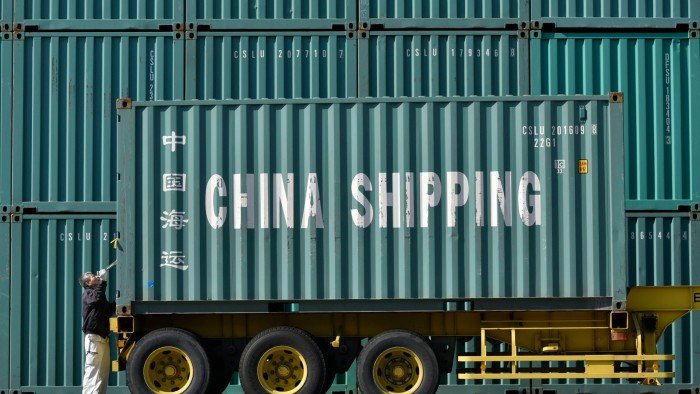This article is an on-site version of our FirstFT newsletter. Subscribers can sign up to our Asia, Europe/Africa or Americas edition to get the newsletter delivered every weekday morning. Explore all of our newsletters here
Good morning and welcome back to what promises to be another rocky week for the global economy. More on that below and here’s what else we’re covering.
Chinese businesses are sending increasing volumes of goods to the US via south-east Asia in a bid to evade the tariff wall erected by Donald Trump as part of his trade war.
What is the evidence? The value of Chinese exports to the US dropped by 43 per cent year on year in May, according to figures published by the US census bureau — equivalent to $15bn-worth of goods. But the country’s overall exports rose by 4.8 per cent in the same period, official Chinese data showed.
Why this matters: Last week, Washington struck a trade deal with Vietnam that includes a 40 per cent levy on goods that are trans-shipped through the country, in a move that was widely thought to be targeting Chinese re-exports to the US. Scores of other countries have not yet reached trade deals with Washington but the pause on Trump’s “reciprocal” tariffs ends on Wednesday and any future deals could include additional trans-shipment levies. US Treasury secretary Scott Bessent said on Sunday that the higher tariffs would take effect in August.
And here’s what else we’re keeping tabs on today:
-
Trump-Netanyahu meeting: The Israeli leader will meet Trump at the White House for his third meeting with the US president since his inauguration. Here’s what to expect.
-
Texas floods: Rescuers resume efforts to recover the missing after the devastating flood that has claimed more than 80 lives, including 28 children.
-
UK: The country commemorates the 20th anniversary of the 7/7 attacks in London. One survivor reflects on the lasting impact of that day.
Sign up to our new US headlines service for top stories seven days a week. Register here.
Five more top stories
1. Crypto companies and traders are pouring billions of dollars into tokenised versions of money market and Treasury bond mutual funds. Total assets held in tokenised Treasury products — which include funds whose units have been converted into digital tokens as well as some tokenised US government bonds — have jumped 80 per cent so far this year to $7.4bn. Read more.
2. Donald Trump has lashed out at Elon Musk after the billionaire unveiled plans to launch a new US political party. The US president called his former ally a “train wreck” after Musk said he would form a new political party to fight the “one-party system” afflicting America. Tesla shares slid 7 per cent in pre-market trading.
3. The Tony Blair Institute participated in a project to develop a postwar Gaza plan that envisaged kick-starting the enclave’s economy with a “Trump Riviera” and an “Elon Musk Smart Manufacturing Zone”. The plan outlined in a slide deck, seen by the Financial Times, was led by Israeli businessmen and used financial models developed inside Boston Consulting Group. Stephen Foley and Jim Pickard have the exclusive story.
4. The EU is holding back on signing a joint declaration on climate action with China at a leaders’ summit this month, refusing to agree a communiqué unless Beijing pledges greater efforts to cut its greenhouse gas emissions. The latest development is adding to tensions over trade and Russia’s war on Ukraine.
5. Amazon and Walmart will go head to head in an online discount battle this week, after the ecommerce giant moved the start of its annual “Prime Day” digital sales event to July 8, matching the date of the world’s biggest retailer’s sales period last year. Read more on the brewing clash for US consumer dollars.
Today’s Big Read
BlackRock founder and chief executive Larry Fink © Alex Wheeler/FT montage/Getty Images
Seven years after BlackRock’s last big foray into private credit, last week Larry Fink finally turned the world’s largest asset manager into a player. The completion of the $12bn takeover of HPS Investment Partners completes a trio of takeovers that shift BlackRock from a position of dominance in public markets to one where it straddles both public and private assets. How it integrates HPS, the final piece of last year’s almost $30bn deal spree, has the potential to determine what role BlackRock gets to play.
We’re also reading . . .
-
The Rashomon effect: Today’s global economy is witnessing many potentially market-moving vectors simultaneously in play, writes Rana Foroohar.
-
Death of the apprenticeship model?: As hybrid working and AI upend on-the-job learning, employers are thinking about what this means for junior staff, writes Emma Jacobs.
-
Bosnia and Herzegovina: Three decades after the Srebrenica massacre trouble is brewing again in the ethnically divided state.
-
RV sales: Americans are putting the brakes on what social media calls #VanLife (premium subscribers only).
Chart of the day
Retail traders “buying the dip” in US stocks this year have racked up the biggest profits since the early stages of the Covid-19 crisis, helping to fuel a rally that has pushed Wall Street equities to record highs. “The dip-buying belief has become the new religion,” said one analyst.
Take a break from the news
More than any other superhero, Superman needs a brighter, less fraught world, writes Stephen Bush. As the superhero returns to our screens, Stephen Bush asks do we still need Superman?
David Corenswet stars as Clark Kent in the 2025 ‘Superman’ film © Alamy

